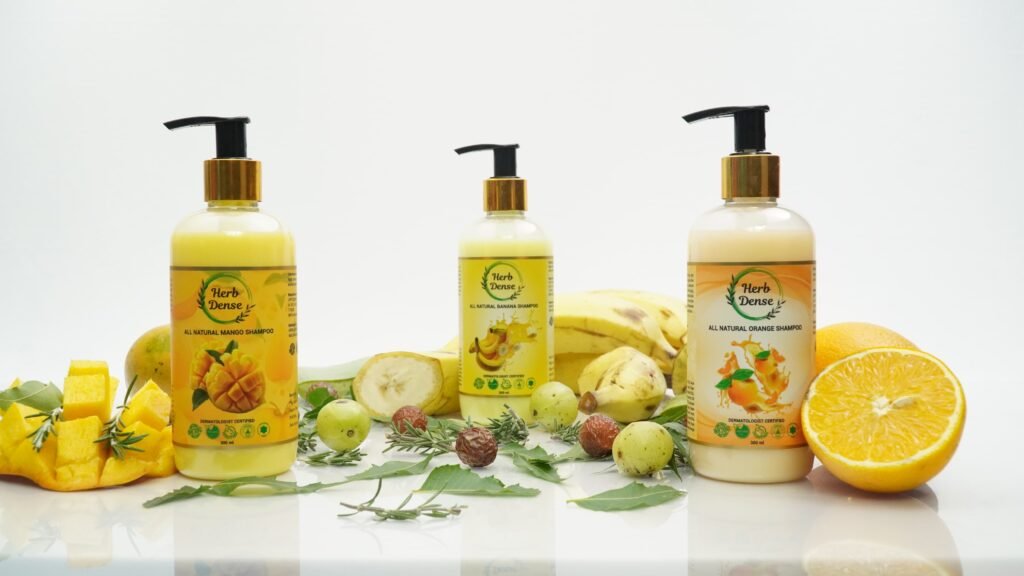Herbal shampoo is a hair care product formulated using natural ingredients derived from plants, herbs, and other organic sources. Unlike conventional shampoos, which often contain synthetic chemicals such as sulfates, parabens, and artificial fragrances, herbal shampoos rely on botanical extracts to cleanse, nourish, and protect the scalp and hair. These shampoos are typically free from harsh additives, making them a popular choice for individuals seeking a gentler, more environmentally friendly alternative for their hair care routine.
Ingredients in Herbal Shampoos
The defining characteristic of herbal shampoos is their use of plant-based ingredients. These components are selected for their therapeutic properties, which address various hair and scalp issues. Some commonly used herbs and natural elements in herbal shampoos include:
- Aloe Vera: Known for its soothing and moisturizing properties, aloe vera helps combat dryness, reduce dandruff, and promote a healthy scalp.
- Neem: Renowned for its antibacterial and antifungal qualities, neem is effective in managing scalp infections and dandruff.
- Hibiscus: Rich in vitamins and antioxidants, hibiscus aids in strengthening hair roots, preventing premature graying, and adding shine.
- Shikakai: A natural cleanser, shikakai is gentle on the hair and helps maintain its natural oils while promoting hair growth.
- Amla (Indian Gooseberry): Packed with vitamin C, amla nourishes the hair, reduces hair fall, and enhances overall scalp health.
- Tea Tree Oil: This essential oil is a popular addition for its ability to reduce dandruff, soothe irritation, and unclog hair follicles.
- Coconut Milk: A rich source of vitamins and fats, coconut milk deeply hydrates and strengthens hair strands.
These ingredients work synergistically to address a range of hair and scalp concerns while minimizing the risk of irritation or damage caused by synthetic chemicals.
How Does Herbal Shampoo Work?
Herbal shampoos function similarly to regular shampoos but with a distinct emphasis on natural cleansing and nourishment. The working mechanism of herbal shampoos can be broken down into the following steps:
- Cleansing: Herbal shampoos cleanse the scalp and hair by gently removing dirt, excess oil, and product buildup. Natural surfactants like soapnuts (reetha) or shikakai replace harsh synthetic detergents, ensuring a mild yet effective cleaning process. These plant-based cleansers preserve the hair’s natural oils, preventing over-drying.
- Nourishment: The herbs and plant extracts in herbal shampoos deliver essential nutrients to the scalp and hair follicles. Ingredients like amla and bhringraj provide vitamins, antioxidants, and minerals that strengthen the hair from the roots, reducing breakage and split ends.
- Scalp Care: A healthy scalp is the foundation for strong and vibrant hair. Herbal shampoos often contain ingredients like neem and tea tree oil, which have antimicrobial and anti-inflammatory properties. These elements help soothe itchy, irritated scalps and combat issues like dandruff, infections, and clogged follicles.
- Moisturization: Many herbal shampoos include hydrating ingredients such as aloe vera, coconut milk, or shea butter. These components help lock in moisture, leaving hair soft, smooth, and manageable.
- Hair Strengthening: By fortifying hair follicles and strands with herbal nutrients, these shampoos improve hair texture and reduce hair fall over time. Proteins and vitamins from natural sources like hibiscus and fenugreek contribute to this strengthening process.
- Promotion of Hair Growth: Ingredients like bhringraj and rosemary oil are known for stimulating blood circulation in the scalp, which encourages healthy hair growth. Regular use of herbal shampoos can result in thicker, healthier hair.
- Free from Harsh Chemicals: One of the primary benefits of herbal shampoos is their exclusion of harmful chemicals like sulfates, parabens, and silicones. This ensures a more balanced pH level for the scalp, reducing irritation and long-term damage.
Benefits of Using Herbal Shampoo
Switching to herbal shampoos offers several advantages, including:
- Gentle on Hair and Scalp: The mild cleansing agents in herbal shampoos make them suitable for all hair types, including sensitive scalps.
- Environmentally Friendly: Herbal shampoos are often biodegradable and packaged in eco-friendly materials, making them a sustainable choice.
- Reduced Risk of Allergies: Free from synthetic fragrances and harsh chemicals, herbal shampoos are less likely to trigger allergic reactions.
- Holistic Hair Care: By nourishing the scalp and hair, herbal shampoos address underlying hair issues rather than just masking them.
- Suitable for Daily Use: Unlike chemical-laden shampoos, herbal shampoos can be used daily without causing excessive dryness or damage.
Are Herbal Shampoos Effective for All Hair Types?
Herbal shampoos are versatile and can cater to various hair types and concerns. However, their efficacy depends on the specific formulation and the individual’s hair needs. For example:
- Oily Hair: Formulas with ingredients like tea tree oil or neem help regulate sebum production and keep the scalp fresh.
- Dry Hair: Shampoos with aloe vera, coconut milk, or argan oil provide deep hydration.
- Dandruff-Prone Hair: Neem, tea tree oil, and antifungal herbs are effective in controlling flakes and itching.
- Thinning Hair: Ingredients like bhringraj, amla, and rosemary oil boost hair growth and add volume.
Choosing the Right Herbal Shampoo
When selecting a herbal shampoo, it is essential to consider your hair type, scalp condition, and specific concerns. Look for shampoos with transparent ingredient lists and avoid those containing hidden synthetic chemicals disguised under natural branding.
Conclusion
Herbal shampoo represents a holistic approach to hair care, blending nature’s wisdom with modern needs. It works by cleansing, nourishing, and protecting the hair and scalp using plant-based ingredients. Whether you are looking to address a particular hair issue or simply want a chemical-free alternative, herbal shampoos offer a gentle yet effective solution. With consistent use, they can improve hair health, enhance natural shine, and promote overall well-being, all while being kind to the environment.

